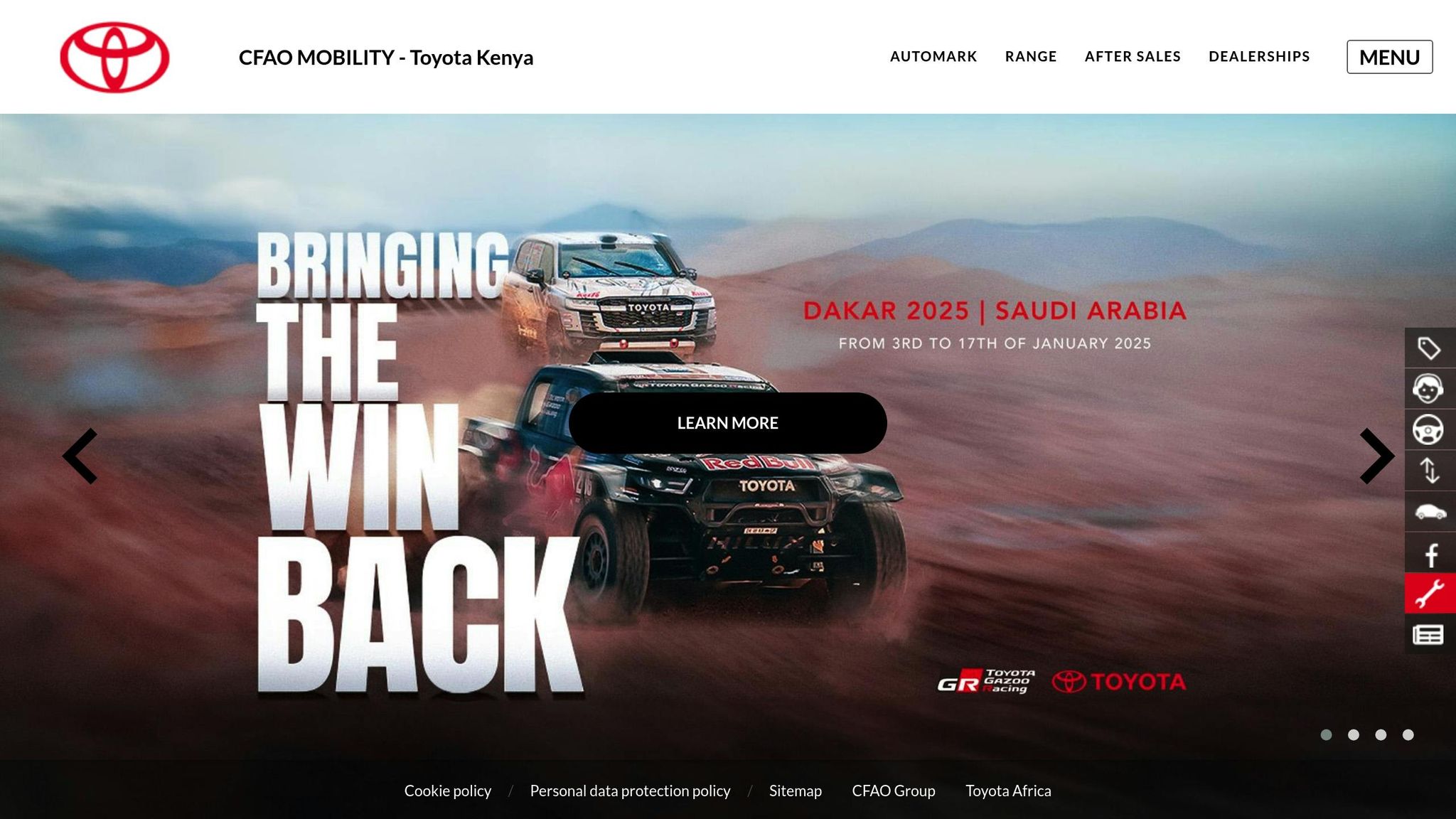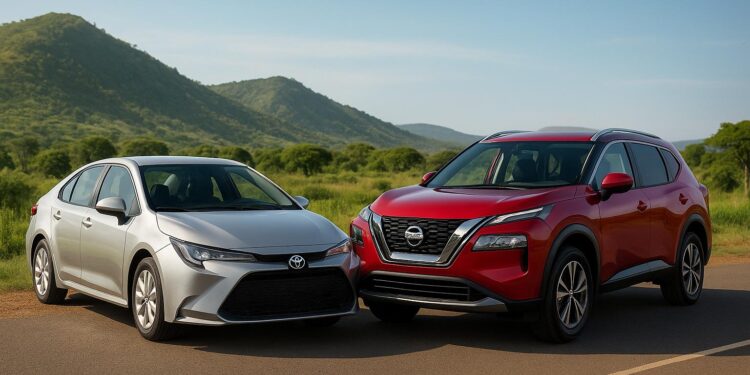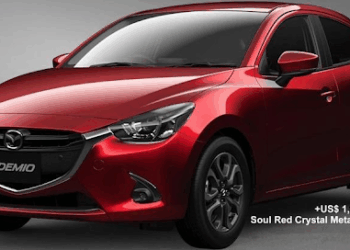When deciding between Toyota and Nissan in Kenya, here’s the quick answer: Toyota offers better resale value, reliability, and service networks, while Nissan provides lower upfront costs and modern features. Both brands are popular for their ability to handle Kenya’s tough road conditions, but your choice will depend on your budget, driving needs, and long-term plans.
Key Highlights:
- Price: Nissan models like the March (KSh 800,000) and Note (KSh 1,050,000) are cheaper than Toyota’s Passo (KSh 820,000) and Vitz (KSh 1,100,000).
- Resale Value: Toyota vehicles retain up to 75% of their value after five years, making them a better long-term investment.
- Durability: Toyota ranks higher in reliability, especially for rugged terrains, while Nissan offers competitive off-road options like the Patrol.
- Service & Parts: Toyota’s extensive dealership network and spare parts availability give it an edge over Nissan.
Quick Comparison:
| Aspect | Toyota | Nissan |
|---|---|---|
| Price (Small Cars) | Passo: KSh 820,000 | March: KSh 800,000 |
| Resale Value | Retains up to 75% after 5 years | Lower resale value |
| Reliability | Ranked #1 globally | Ranked #12 globally |
| Service Centers | 40+ dealerships across Kenya | Supported by Nissan Owners Club |
| Off-road Capability | Strong (e.g., Land Cruiser) | Even stronger (e.g., Patrol) |
If you’re looking for a budget-friendly option with modern features, go for Nissan. For durability, resale value, and long-term savings, Toyota is the better pick.
Toyota and Nissan in Kenya Today

Toyota’s Local Presence
Toyota currently holds a 22.4% market share as of Q1 2025, with sales growing by 50.9% during that period. In July 2023, Toyota Tsusho began local production of the Fortuner SUV at the AVA Mombasa Plant. This facility is designed to produce 350 units annually, aiming to meet Kenya’s increasing demand for SUVs while cutting delivery times for local buyers. The launch event was attended by Kenyan President William Ruto, emphasizing Toyota’s economic role in the country.
Toyota’s distributor, CFAO Mobility Kenya Limited, operates more than 40 dealerships across the nation. Additionally, the company invested $1.2 million to establish the Fortuner assembly line in Mombasa County.
Nissan’s Local Presence
Nissan’s position in Kenya is evolving amid rising competition. While Nissan saw a 105% sales increase in 2021, recent data from Q1 2025 highlights shifting dynamics. Isuzu leads with a 54.7% market share, followed by Toyota at 22.4%, and Mitsubishi at 6.3%.
The competition has intensified, with brands like Mitsubishi showing rapid growth.
| Brand | Q1 2025 Market Share | Growth Rate |
|---|---|---|
| Isuzu | 54.7% | 76.9% |
| Toyota | 22.4% | 50.9% |
| Mitsubishi | 6.3% | 1,125% |
Toyota’s focus on local production and its extensive dealership network gives it an edge, while Nissan is adjusting its strategies to stay competitive in this increasingly crowded market. These developments offer insight into the pricing and value differences between the two automakers.
Price and Value Analysis
Purchase Price Comparison
In Kenya, Toyota and Nissan models show notable price differences. For small cars, the Nissan March costs KSh 800,000, slightly less than the Toyota Passo at KSh 820,000. Similarly, the Nissan Note is priced at KSh 1,050,000, undercutting the Toyota Vitz at KSh 1,100,000. When it comes to commercial vehicles, the Nissan Ad Van (KSh 780,000) is more affordable than the Toyota Probox (KSh 1,100,000).
| Vehicle Category | Toyota Model | Price (KSh) | Nissan Model | Price (KSh) |
|---|---|---|---|---|
| Small Cars | Passo | 820,000 | March | 800,000 |
| Compact Cars | Vitz | 1,100,000 | Note | 1,050,000 |
| Commercial | Probox | 1,100,000 | Ad Van | 780,000 |
These price differences highlight the upfront cost savings Nissan offers in specific categories.
Long-term Value
Initial pricing is just one part of the story. Over time, Toyota models stand out for their reliability and resale value. According to industry data, Toyota’s durable technology ensures vehicles last longer and require fewer repairs, which translates into better resale prices.
"The market tends to have much greater demand than Toyota supplies up front, which keeps resale high, which keeps consumers happy, and the cycle continues on and on", says Tyson Jominy, vice president of data analytics at J.D. Power.
For example, Toyota’s utility vehicles like the 4Runner retain around 75% of their value after five years. This strong resale performance is supported by several factors:
- Parts Availability: Toyota’s widespread dealer network in Kenya ensures easy access to replacement parts.
- Service Infrastructure: A large pool of qualified mechanics familiar with Toyota vehicles.
- Brand Recognition: A reputation for reliability and durability that resonates with buyers.
- Maintenance Costs: Lower long-term expenses compared to competitors.
These factors make Toyota a solid choice for those looking at the bigger picture.
Road Performance and Build Quality
Fuel Usage and Road Handling
Toyota and Nissan vehicles are well-suited for Kenya’s varied road conditions. Toyota stands out for its fuel efficiency and steady handling, making it a dependable choice for both city streets and rural terrains. Its engineering prioritizes practicality, delivering reliable performance and fuel savings across different models. Beyond fuel economy, both brands are known for their durability, but Toyota’s reputation in this area is particularly strong.
Build Quality and Repairs
Durability is a top priority when tackling Kenya’s rugged roads. According to Consumer Reports, Toyota ranks as the most reliable car brand, while Nissan comes in at 12th out of 32 manufacturers. This difference highlights Toyota’s ability to minimize repair needs and keep maintenance costs lower. This reliability aligns with Toyota’s overall value, as previously discussed in the price and value analysis.
The Toyota Hilux is a prime example of this durability, often praised as a tough and reliable option for Kenyan drivers. On the other hand, Nissan models are appreciated for their performance-oriented design and competitive pricing. However, their long-term reliability has been less consistent compared to Toyota.
Service and Parts
Service Costs
In Kenya, having access to reliable service centers is a priority for vehicle owners. Toyota Kenya, under CFAO Mobility, operates a wide network of official service centers. Similarly, Nissan owners can rely on the Nissan Owners Club of Kenya (NOCK) to connect with approved service providers. Both brands ensure their customers have dependable options for maintenance and repairs.
Parts Network
A solid parts network is just as important as service availability, and both Toyota and Nissan deliver on this front. For Nissan owners, NOCK provides access to a network of trusted service centers and parts suppliers, ensuring ease of maintenance. In Nairobi, NOCK-approved service centers include:
- Maxwell Auto Garage & Nissan Autotronics
- The Surgeon KE
- Insight Auto Nissan Garage
- Jamba Auto
- Tinap Service Center
- Kraft Diagnostics
For those along the coast, NOCK recommends Amos in Mombasa as the go-to service provider.
Toyota also ensures its parts are easy to find, thanks to its strategic partnerships. For example, Mourkabs Auto Spares, located on Kirinyaga Road opposite Toyota Kenya in Nairobi, serves as a major supplier of genuine Toyota parts. This setup ensures Toyota owners can quickly source the parts they need.
sbb-itb-e5ed0ed
Popular Models Head-to-Head
4x4s: Toyota Land Cruiser vs Nissan Patrol
When comparing the Toyota Land Cruiser and Nissan Patrol, both stand out as rugged options for tackling Kenya’s challenging terrain. However, they come with distinct strengths and weaknesses.
The Patrol boasts better ground clearance, making it a strong choice for off-road adventures. On the other hand, the Land Cruiser is known for its solid all-around performance. Both vehicles, however, have their mechanical quirks – Toyota struggles with gearbox and oil consumption issues, while Nissan deals with problems tied to specific models.
| Aspect | Toyota Land Cruiser | Nissan Patrol |
|---|---|---|
| Off-road Capability | Strong | Even stronger |
| Common Issues | Gearbox and oil concerns | Model-specific mechanical issues |
| Ground Clearance | Good | Higher |
| Terrain Handling | Reliable | More adaptable |
The Nissan Patrol’s edge in off-road capability makes it a great fit for poorly maintained roads. Still, both models are reliable performers across a variety of conditions.
NISSAN VS TOYOTA Resale Value in Kenya
Making Your Choice
Here’s how to narrow down your decision based on price, performance, and service considerations:
Budget-Friendly Options
For buyers in Kenya looking to save, both Toyota and Nissan offer affordable choices. Toyota stands out with lower maintenance costs, making long-term ownership easier on the wallet. Nissan, on the other hand, provides modern features that add extra value. The best option will depend on balancing upfront costs with ongoing expenses.
Built to Last
Toyota’s reputation for durability is well-earned, making it a reliable choice. Nissan has also stepped up its game, improving both build quality and reliability in recent years. Both brands are designed to handle Kenya’s challenging road conditions and varying driving needs.
Tailored to Your Needs
If your focus is on city driving, Nissan offers efficient models packed with modern features. For business use or rural driving, Toyota takes the lead with its dependable performance and lower operating costs. Compare key features and performance metrics to find the brand that aligns with your driving priorities and budget.
FAQs
How do Toyota and Nissan compare when it comes to long-term maintenance costs in Kenya?
Both Toyota and Nissan are popular in Kenya for their affordability and reliability, but they differ in terms of maintenance costs over time. Toyota vehicles are often praised for their durability and widespread availability of spare parts, which makes repairs more affordable and convenient. On the other hand, Nissan vehicles may have slightly higher maintenance costs due to less readily available parts in some areas, though they are still considered reliable.
The actual cost will depend on the specific model, how well the car is maintained, and driving conditions. Toyota tends to have a slight edge in long-term affordability due to its reputation for lower repair expenses and better resale value in the Kenyan market.
What should you consider when deciding between Toyota and Nissan for off-road driving in Kenya?
When choosing between Toyota and Nissan for off-road driving in Kenya, it’s important to consider a few key factors to ensure the vehicle meets your needs and performs well in challenging terrains.
First, reliability is crucial. Toyota vehicles are widely known for their durability and ability to handle rough roads, making them a popular choice for off-road conditions. Nissan also offers reliable models, but specific options like the Patrol are better suited for rugged environments.
Next, look at affordability and maintenance costs. Toyota tends to have higher resale value and a larger availability of spare parts in Kenya, which can make maintenance easier and more cost-effective. Nissan vehicles, on the other hand, may offer more budget-friendly initial prices but could have fewer spare parts readily available.
Finally, consider fuel efficiency and performance. Toyota models like the Land Cruiser are known for their fuel efficiency and off-road capabilities, while Nissan models like the X-Trail or Navara provide a balance of power and comfort. Evaluate your budget and driving needs to choose the right fit for Kenya’s diverse road conditions.
How does local production of Toyota vehicles affect their availability and pricing in Kenya?
Local production of Toyota vehicles in Kenya, such as the Fortuner SUV, plays a significant role in improving their availability. By assembling vehicles locally, Toyota can reduce supply chain delays, ensuring faster delivery to customers.
Additionally, local production often lowers costs associated with import duties and shipping, making these vehicles more competitively priced. This not only benefits buyers but also supports the growth of Kenya’s automotive industry and creates local job opportunities.
Related posts
- Why Land Rover Fits Kenyan Roads Best
- Land Cruiser vs. Prado: Best for Kenyan Off-Roading
- Best used cars to buy in Kenya
- Most sold cars in Kenya this year




